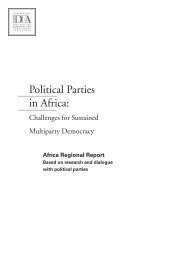Background Document - Danish Institute for Parties and Democracy
Background Document - Danish Institute for Parties and Democracy
Background Document - Danish Institute for Parties and Democracy
You also want an ePaper? Increase the reach of your titles
YUMPU automatically turns print PDFs into web optimized ePapers that Google loves.
A year later, women in the Arab Spring countries in transition are beginning to ask<br />
why the benefits from the revolutions do not seem to be shared equally between men<br />
<strong>and</strong> women. Why are few women represented in key decision making positions <strong>and</strong> institutions<br />
across the countries in spite of women’s active participation alongside their<br />
male counterparts during the revolutions <strong>and</strong> uprisings to end the reign of dictatorships?<br />
Recently, the President of the Egyptian Feminist Union, Hoda Badran, stated that,<br />
“Now that the dust of revolution has begun to settle as the Arab spring countries<br />
begin their transition process towards democracy, women are finding themselves<br />
marginalised <strong>and</strong> excluded from decision-making. The many disturbing incidents<br />
that have occurred illustrate the extent to which, in spite of the new freedoms championed<br />
by revolution, women are still considered as subordinate to men. In Tunisia<br />
a mass protest called <strong>for</strong> all women to be veiled, which led to unveiled female professors<br />
of religion being hounded off campuses. Mobs shouted at Tunisian women<br />
demonstrators to go back to the kitchen “where they belong”. In Egypt, too, conservative<br />
thinking is on the rise <strong>and</strong> voices are growing louder in support of policies that<br />
would represent a backward step <strong>for</strong> women. A good example of this are the re<strong>for</strong>ms<br />
being made to family legislation.” 1<br />
The words of Tawakkol Karman, a Yemeni journalist <strong>and</strong> first Arab woman to receive<br />
the Nobel Peace Prize in 2011 aptly capture the reason <strong>for</strong> hope <strong>and</strong> expectations<br />
<strong>for</strong> change <strong>for</strong> women in Arab Spring countries, namely Tunisia, Egypt, Libya, Yemen<br />
<strong>and</strong> Syria <strong>and</strong> in other Arab countries such as Algeria, Morocco, Bahrain, Sudan, Saudi<br />
Arabia. In her speech at the Nobel Peace Prize ceremony, she stated that,<br />
“Millions of Yemeni women <strong>and</strong> men, children, young <strong>and</strong> old took to the streets<br />
in eighteen provinces dem<strong>and</strong>ing their right to freedom, justice <strong>and</strong> dignity, using<br />
non-violent but effective means to achieve their dem<strong>and</strong>s. I see the great number of<br />
Arab women, without whose hard struggles <strong>and</strong> quest to win their rights in a society<br />
dominated by the supremacy of men I wouldn’t be here. This supremacy has caused<br />
a lot of injustice to both men <strong>and</strong> women. To all those women, whom history <strong>and</strong> the<br />
severity of ruling systems have made unseen, to all women who made sacrifices <strong>for</strong><br />
the sake of a healthy society with just relationships between women <strong>and</strong> men, to all<br />
those women who are still stumbling on the path of freedom in countries with no social<br />
justice or equal opportunities, to all of them I say: thank you ... this day wouldn’t<br />
have come true without you.” 2<br />
BATTLES FOR RECOGNITION AND PARTICIPATION<br />
Most transitions towards democratic changes are motivated by expectations <strong>for</strong> greater<br />
social equity, improved political participation <strong>and</strong> representation in making decisions<br />
that impact on societies <strong>and</strong> the lives of many women <strong>and</strong> men. Yet around the<br />
world, women have found that, “participation is one thing <strong>and</strong> recognition <strong>and</strong> voice<br />
is another”.<br />
In past <strong>and</strong> present transitional processes, women’s meaningful participation can<br />
be illustrated by an analogy of a journey, which is best captured by expressions such<br />
as, “still have a long way to go”. As women’s participation in revolutionary transitions<br />
is evident, their dem<strong>and</strong>s <strong>for</strong> inclusion continue to rise. For example in Egypt, Dr.<br />
Omaima Kamel, a member of the Constituent Assembly tasked with drafting Egypt’s<br />
1 Article by Hoda Badran, The Arab Spring is looking like a great leap backwards <strong>for</strong> women,<br />
Summer 2012<br />
2 http://www.nobelprize.org/nobel_prizes/peace/laureates/2011/karman-lecture_en.html<br />
WOMEN IN POLITICS DANISH INSTITUTE FOR PARTIES AND DEMOCRACY PAGE 39
















